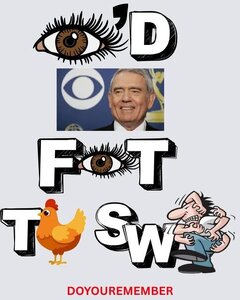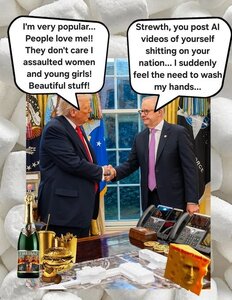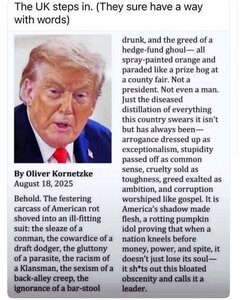-
Posts
14,114 -
Joined
-
Last visited
-
Days Won
680
Content Type
Profiles
Forums
Gallery
Downloads
Blogs
Events
Our Shop
Movies
Everything posted by red750
-
A guy is being interviewed for a job. Interviewer: Do you have any allergies? Applicant: Caffeine. Interviewer: Have you ever worked in public service? Applicant: I was in the military, I did two tours in Iraq. Interviewer: Very good. That gives you a lot of points. Do you have any disabilities? Applicant: A bomb went off close to me and I lost both testicles. Interviewer (winces): Wow! That gives you enough points for me to hire you straight away. Our hours at 8: am to 400 pm. You can start at 10:00 am tomorrow and every other day. Applicant: How come 10:00 am? I don't want any special privileges. Interviewer. Remember, this is a council job. We spend the first two hours standing around drinking coffee and scratching our balls. There is no need for you to be here for that.
-
-
When I came out of the Forest Hill Chase carpark after my eyetests, I passed a Googletrekker photograper walking out of the carpark.
-
Thanks OME.
-
Paddy was visiting Mick's house where they were playing cards and enjoying a few drinks. When Paddy went to leave, they noticed it was pouring with rain. Mick said to Paddy, "Stay here for the night, I'll go and make up a bed." Then he headed upstairs. When he came back down, Paddy was standing there soaked to the skin. "What happened?" asked Mick. Paddy replied, "I went home for my pyjamas."
-
-
Different sort of day today. First, off to H & R Block to do my tax returm. Their estimate is a refund of about $1200. Then to Specsavers for new glasses. (My health insurance gives a 100% refund on two pairs of specs, one long rsange, one for reading). Haven't had my eyesight tested in 7 years. Lots of tests, and happy with the results. No macular degeneration, no sign of cataracts, and only minor indications of glaucoma, too insignificant to do anything about at present. A different way to spend your birthday, but I had feck all else to do.
-
-
-
A body language expert has described Anthony Albanese's meeting with Donald Trump a 'massive success', claiming the Prime Minister 'did Australians proud'. Dr Louise Mahler told Daily Mail the choreography between Albanese and Trump at the White House spoke volumes about power, confidence, and crisis. 'This was a hugely positive interaction for Albanese,' Dr Mahler said. 'He was strong, he was clearly told, "Come on, go for it, power up," and he did. It was extraordinary because Trump doesn't allow that to happen to anybody.' Dr Mahler claimed Kevin Rudd's performance was less than impressive and that Australia's ambassador to the US appeared to suffer a 'political crisis'. Aside from his awkward exchange with Trump, she claimed the key giveaway that he was stressed was the fact that he repeatedly reached out for his glass of water. She claimed his handling of the situation was so poor that the Albanese government would likely distance itself from Rudd. According to Dr Mahler, every element of the meeting was meticulously staged to project harmony between Albanese and Trump. 'Every move is choreographed,' she explained. 'Trump can be unpredictable, but the message was clear: Albanese will be praised and honoured, and Trump will let it pass.' Dr Mahler said the message played out in subtle but telling gestures. Albanese initiated the handshake, secured the last word as he entered the building, a rarity with Trump, and spoke without interruption. 'Normally under stress, Albanese's jaw jams and he mumbles, but not this time,' Dr Mahler said. 'He followed the rules and did us proud.' Dr Mahler said the optics were striking given Trump's reputation for dominance. 'Trump lets no one have the last word,' she said. 'For Albanese to achieve that shows how carefully this was managed.' But while Albanese thrived, Rudd appeared to shrink from view, with Dr Mahler saying that he 'didn't exist'. 'He was sitting there motionless, pretending he didn't exist. When the incident happened, he had a complete panic attack,' she said. Dr Mahler said Rudd was visibly rattled after Trump looked at him and said: 'I don't like you and I never will.' 'His mouth dried up and he grabbed a glass of water. Fifteen seconds later, he grabbed another,' Dr Mahler said. 'Nobody else was drinking water. These are signs of stress.' Rudd's discomfort was compounded by his lack of engagement. 'When questions were asked, every head turned, not Rudd's. He stared straight ahead or at the table. He was in total shock,' Dr Mahler said. 'I personally think this was a life crisis, a political crisis.' Dr Mahler said the contrast between the two Australians could not have been sharper. 'Albanese will dine out on that for the rest of his life,' she said. 'For Rudd, it was a politician's nightmare.' Dr Mahler said the meeting itself, held against a backdrop of strategic cooperation and speculation over rare earth deals, was unusually warm by Trump's standards. 'Think of the bizarreness of it,' she said. 'They are different sides of politics. Trump praises nobody. It was really weird, which makes me wonder what's in that document they signed.' Even in the photo-op, body language told its own story.
-
There is also a retail space with a hoarding around it for more than twelve months with a sign saying "Wei's kitchen - coming soon."
-
My original super, accrued in the 30 years I was in the bank, before Paul Keatings compulsory super, was called Officers Provident Fund, basically all member voluntary, and not preserved. When my bank was taken over, euphemistically called a merger, the new entity did not need two lots of staff, and many of the staff of the minnow (my bank), were retrenched. Lots of staff looking for new jobs that didn't exist. Because my wife was working, she earned enough to tip our combined income over the threshhold for unemployment benefits, so social security deemed I was not entitled to the dole. I was educating three kids, two in secondary college. Soc Sec advised that I should draw down this unpreserved money to live on. Worried that my mortgage could be foreclosed, we also paid it off from this fund. So when I got a job and could pay super under Keatings scheme, I was virtually starting from scratch. My salary was a few thousand less than I was earning in the bank, and the 3% employer contributions were not much. So when I retired (under duress) in 2010, II didn't have a lot accrued. I have now been retired for 15 years, and what I had didn't last long, about 5 years. I have relied entirely on the pension since about 2016. Since my wife died in 2022, I have managed to clear all debt and accrue a couple of thousand in savings. There won't be much more than the house to leave to the kids.
-

Well known personalities who have passed away recently (Renamed)
red750 replied to onetrack's topic in General Discussion
American chess grandmaster Daniel Naroditsky dies unexpectedly aged 29 -




















